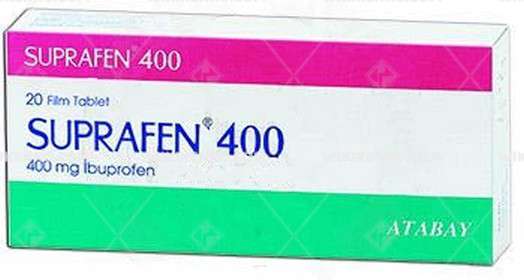Suprafen Film Tablet
Suprafen, presented in the form of a film tablet, is a pharmaceutical wonder. Packed with 400 mg of ibuprofen as its active ingredient, this medication belongs to the illustrious class of non-steroidal anti-inflammatory drugs (NSAIDs). In this comprehensive exploration, we delve into the intricacies and its multifaceted utility.
| Dosage form | |
|---|---|
| Pack size | |
| Potency | 400 Mg |
| Manufacturer | |
| Origin | |
| Generic Name (Ingredient) | Each Film Tablet Contains 400 Mg Ibuprofen. |
Assuming your emergency circumstances for this product, visit Urgent Quotation page. Besides, for any pharmaceutical questions, please ask us in the comments section.
Description
This masterpiece is meticulously crafted by Atabay, a pharmaceutical giant with a history that stretches back to 1939. Istanbul-based and founded by the visionary Mr. Ö. Kemalettin Atabay, this company’s dedication to pharmaceutical excellence shines through the creation of Suprafen Film Tablet.
Uses
Suprafen dons several hats in the medical world, serving diverse purposes. It comes to the rescue in the following scenarios:
- Rheumatic Inflammatory Diseases: It is a stalwart in alleviating the symptoms of rheumatic inflammatory diseases that affect the joints, including rheumatoid arthritis, osteoarthritis, and ankylosing spondylitis.
- Gout-Induced Joint Inflammation: Inflammation of joints arising from gout, the notorious “drop” disease, is met with effective relief from Suprafen.
- Musculoskeletal Pain: It steps in to ease the burden of acute musculoskeletal pain, providing comfort and reprieve.
- Post-Operative Pain: Post-surgical operations, Suprafen comes as a trusted companion in managing pain and discomfort.
- Menstrual Pain: The tablet extends its soothing touch to relieve menstrual pain (primary dysmenorrhea without organic cause).
Precautions
Before embarking on the Suprafen journey, certain precautions deserve meticulous attention:
Cardiovascular (CV) Vigilance: Be mindful of the potential cardiovascular risks. NSAIDs like Suprafen may pose the threat of fatal CV thrombotic events, myocardial infarctions, and strokes. The duration of use is a critical factor. Those with CV disease or its risk factors should exercise caution.
Gastrointestinal (GI) Safeguards: The GI tract can be a battlefield for NSAIDs. Serious adverse effects, including bleeding, ulceration, and intestinal perforation, may lurk without warning. The elderly are especially vulnerable to these risks.
Contraindications
In certain circumstances, Suprafen should be unequivocally avoided:
- Last Trimester of Pregnancy: Steer clear of Suprafen during the final three months of pregnancy.
- Hypersensitivity: If you exhibit hypersensitivity or allergies to ibuprofen or any of the tablet’s components, Suprafen should not find a place in your medication regimen.
- Prior Allergic Reactions: Individuals who have previously experienced allergic reactions such as asthma, nasal inflammation (rhinitis), or hives in response to ibuprofen, aspirin, and other NSAIDs should exercise caution.
- History of GI Issues: Those with a history of stomach or intestinal bleeding or perforation due to these medications should refrain from using It.
- Chronic GI Conditions: If recurrent stomach-duodenal ulcers or inflammatory bowel diseases like ulcerative colitis and Crohn’s disease are part of your medical history, the use of Suprafen is contraindicated.
Side Effects
Much like its NSAID counterparts, Suprafen may introduce a range of side effects. Here are some common companions on this pharmaceutical journey:
- Headache
- Dizziness
- Drowsiness, Fatigue, Restless Sleep
- Thirst and Sweating
- Tingling or Numbness in Extremities
- Ringing in the Ears
- Blurred Vision and Eye Irritation
- Fluid Retention and Ankle Swelling
It’s imperative to remember that not everyone encounters these side effects, and experiences can vary from person to person. Should any unusual symptoms manifest while using Suprafen, prompt consultation with a healthcare professional is strongly recommended.
Additionally, it should be approached with caution in patients dealing with peptic ulcer disease, gastrointestinal perforation or bleeding, bleeding disorders, compromised renal function, hypertension, or cardiac impairment.
Commencement of Action
The onset of action for ibuprofen, the star ingredient in Suprafen, is a dynamic timeline. Variables such as an individual’s metabolic rate, specific drug formulation, and the targeted condition play a role in this journey. Typically, ibuprofen springs into action within 30 minutes to 1 hour after ingestion. Nevertheless, for certain conditions or symptoms, a few weeks of consistent usage may be required before substantial relief is achieved. To navigate this unique journey effectively, seeking personalized guidance from a healthcare professional is indispensable.
Dosage
The recommended dosage of Suprafen can be likened to a tailored suit, designed to fit individual characteristics. Here are some overarching principles:
For Adults: The typical dose stands at 400 mg, to be taken 3-4 times a day, preferably following a meal. Adjustments may be made, with a maximum of 2.4 g daily, based on symptom severity.
For Adolescents (Over 40 kg Body Weight): The recommended dosage falls within the range of 200 mg to 400 mg (1 or 2 tablets), up to three times a day as needed. Intervals of at least four hours between 200 mg (1 tablet) doses and six hours between 400 mg (2 tablets) doses should be observed.
These are general guidelines and should not replace the advice of a healthcare professional. The precise dosage should be determined based on individual circumstances and professional guidance.
Suprafen Benefits
Suprafen Film Tablet, powered by ibuprofen, unfurls a tapestry of advantages:
- Pain Relief: Suprafen excels in alleviating minor aches and pains, from the nagging headache to toothache, muscular discomfort, backache, and arthritis.
- Fever Reduction: When the temperature rises, Suprafen lends a hand by temporarily reducing fever.
- Anti-Inflammatory Prowess: As a non-steroidal anti-inflammatory drug (NSAID), it’s skilled in taming inflammation, making it an asset in conditions like rheumatoid arthritis and osteoarthritis.
- Menstrual Cramp Relief: It extends its comforting touch to women, providing relief from the throes of menstrual cramps.
It’s crucial to understand that Suprafen alleviates symptoms but doesn’t address the underlying condition. For any medication journey, initiation should be accompanied by a consultation with a healthcare professional.
Precautions
Before embracing Suprafen, certain precautions should be etched in one’s mind:
Allergic Alerts: Suprafen is a no-go if allergies to ibuprofen or any of its components are in the picture.
Asthma and Allergic Ailments: Recent major surgeries or a history of asthma or allergic diseases may introduce shortness of breath in the presence of Suprafen.
Respiratory Challenges: Those suffering from hay fever, nasal polyps, or chronic obstructive respiratory disorders face an increased risk of allergic reactions.
Gastric Battlefield: Avoid Suprafen if you have a history of stomach ulcers or bleeding.
Gastrointestinal Challenges: Prior gastrointestinal perforation or bleeding episodes while on NSAIDs render Suprafen unsuitable.
Active Bleeding: For individuals grappling with cerebrovascular or other active bleeding episodes, Suprafen is not the path to tread.
Blood-Formation Puzzles: It isn’t for those with unexplained blood-formation issues.
Severe Dehydration: If severe dehydration, induced by vomiting, diarrhea, or inadequate fluid intake, is part of the scenario, Suprafen should stay off the table.
Cardiac, Hepatic, and Renal Concerns: Severe liver, kidney, or heart failures should prompt avoidance of Suprafen.
Last Trimester of Pregnancy: In the closing trimester of pregnancy, Suprafen is contraindicated.
Every step in the realm of medication should be choreographed by a healthcare professional’s guidance.
In Closing
This journey through the realms of Suprafen Film Tablet sheds light on its versatile utility, alongside the essential precautions and dosage guidance. The symphony of benefits it offers in pain relief, fever reduction, and anti-inflammatory action is accompanied by a chorus of precautions to ensure safety. Remember, the path to medication should always be paved with the counsel of a healthcare professional.
Overview
| Property | Details |
|---|---|
| Active Ingredient | Ibuprofen |
| Manufacturer | Atabay, Istanbul, founded by Mr. Ö. Kemalettin Atabay in 1939 |
| Uses | Relief of symptoms in rheumatic inflammatory diseases, gout-induced joint inflammation, acute musculoskeletal pain, post-operative pain, menstrual pain. |
| Precautions | Cardiovascular and gastrointestinal risks, contraindications in the last 3 months of pregnancy, hypersensitivity, prior allergic reactions, history of GI issues, recurrent ulcers, gastrointestinal bleeding, cerebrovascular or other active bleeding, blood-formation disturbances, severe dehydration, severe liver, kidney, or heart failure. |
| Side Effects | Common: Headache, Dizziness, Drowsiness, Fatigue, Thirst, Sweating, Tingling, Numbness, Ringing in Ears, Blurred Vision, Eye Irritation, Fluid Retention, Ankle Swelling. |
| Onset of Action | Varies based on factors such as metabolism, formulation, and condition treated. Typically within 30 minutes to 1 hour. |
| Dosage Guidance | For Adults: 400 mg, 3-4 times daily. Adolescents over 40 kg body weight: 200-400 mg (1-2 tablets), up to three times a day as required. Individualized dosing under healthcare professional’s guidance. |
| Benefits | Pain Relief, Fever Reduction, Anti-Inflammatory, Menstrual Cramp Relief. |
Use the form below to report an error
Please answer the questions as thoroughly and accurately as possible. Your answers will help us better understand what kind of mistakes happen, why and where they happen, and in the end the purpose is to build a better archive to guide researchers and professionals around the world.
The information on this page is not intended to be a substitute for professional medical advice, diagnosis, or treatment. always seek the advice for your physician or another qualified health provider with any questions you may have regarding a medical condition. Always remember to
- Ask your own doctor for medical advice.
- Names, brands, and dosage may differ between countries.
- When not feeling well, or experiencing side effects always contact your own doctor.
Cyberchondria
The truth is that when we’re sick, or worried about getting sick, the internet won’t help.
According to Wikipedia, cyberchondria is a mental disorder consisting in the desire to independently make a diagnosis based on the symptoms of diseases described on Internet sites.
Why you can't look for symptoms on the Internet
If diagnoses could be made simply from a textbook or an article on a website, we would all be doctors and treat ourselves. Nothing can replace the experience and knowledge of specially trained people. As in any field, in medicine there are unscrupulous specialists, differences of opinion, inaccurate diagnoses and incorrect test results.




Reviews
There are no reviews yet.